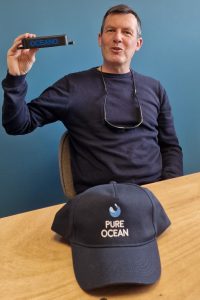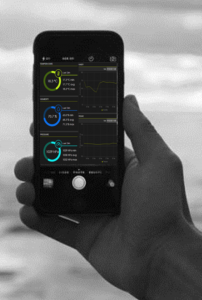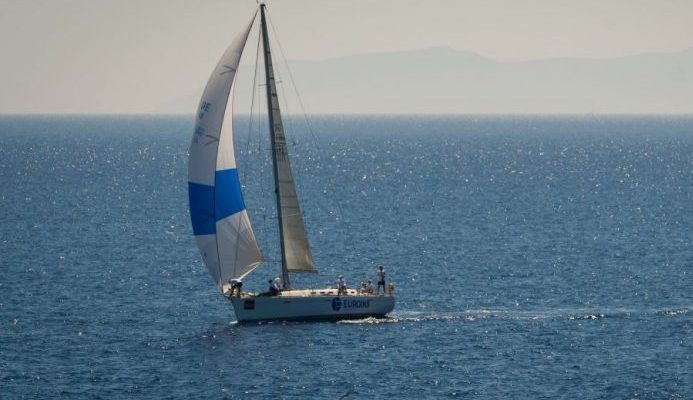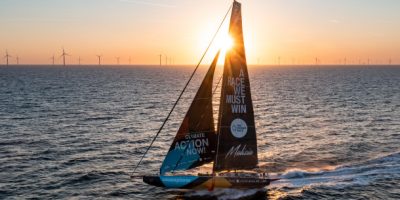The French start-up Oceano Vox intends to revolutionise science by relying on participatory science and the Internet of Things (IoT). Black boxes, placed on hundreds (or even “thousands” according to the start-up) of boats around the world, will collect atmospheric and oceanographic data that will be transmitted several times a day to Ifremer, the French Research Institute for Exploitation of the Sea.
It is a small black box, no bigger than a smartphone, that any yachtsman can take on board his yacht. The current prototype collects air temperature, humidity and pressure, which it combines with data from the boat’s navigation system, i.e. the position of the data and the strength and direction of the wind. In the near future, it is planned that the unit will also measure water temperature and salinity. Other physico-chemical parameters of the ocean can also be measured by this device, such as the pH and CO2 levels in the water.

The box Oceano Vox. © Oceano Vox
Operational oceanography
The data will be transferred to Ifremer via the French nanosatellite constellation Kineis, the third partner in the consortium. These measurements will be used to feed the operational oceanography models that allow the continuous monitoring and forecasting of the ocean’s future.
Like operational meteorology, operational oceanography aims to provide citizens and decision-makers with reliable and targeted information services on the past, present and future state of the ocean. This requires observing the ocean and surface weather conditions systematically and over time, processing and distributing the acquired data in real time for ingestion by numerical models or other information systems, and ultimately disseminating information to users.
As the ocean is even more difficult to observe in situ than the atmosphere, the development of operational oceanography owes much to the emergence of ocean observation satellites. However, the water temperature and humidity data collected by satellites are often noisy, not very accurate and should be used with great caution.
Democratising ocean measurements
According to Ifremer, it is high time to start developing this type of solution. “Boaters call us every week to see if they can collect scientific data during their trip, but we don’t have anything concrete to offer them,” says Lucie Cocquempot, oceanographic observation coordinator at Ifremer.
“When Oceano Vox came knocking on our door to sell us data, we told them that as a public research institute, this was not our philosophy. But Ifremer saw an interest. Why not collaborate and develop an innovative product together to democratise ocean measurements?
“We are interested in testing the performance of this device in a wide range of conditions in order to identify the margin of error compared to our traditional measuring devices, which are very expensive and require maintenance,” continues Lucie Cocquempot. Oceano Vox and Ifremer have therefore responded together to a call for projects from Kineis aimed at boosting the development of marine services using the Internet of Things via their constellation of nanosatellites.
Avoiding the data processing bottleneck
This first stage of the collaboration will enable the development of the technology needed to democratise research, by working on improving the Oceano Vox box, but it also offers a unique opportunity for Ifremer scientists to design a participatory science protocol that works with an existing community of boaters managed by Oceano Vox. Lucie Cocquempot: “We know that when a participatory science project works well, we quickly find ourselves faced with a bottleneck in data processing. We will therefore think carefully about the operational implementation of participatory science and Oceano Vox seemed to us to be a good case study.

Application for smartphone. © Oceano Vox
Links with the blue economy
To ensure its profitability, the start-up Oceano Vox is counting on selling the data collected to other players in the blue economy, such as boat insurance companies, boat rental companies and navigation aid application providers. “We are targeting companies interested in knowing the position of boats and the associated weather conditions,” enthuses Antoine Cousot, the founder of Oceano Vox.
And the interest for the yachtsman? In addition to contributing to a participatory research programme, they have access to data from other boats in the community in real time. “Currently, our community has 300 boats registered on our first platform and several thousand are waiting for the application to be released,” explains Antoine Cousot. “As a sailor, it can be very interesting to see that a boat ahead of you is being swept away by a squall at 45 knots. It’s a tool that will allow you to anticipate local and violent weather systems.
The device will be available free of charge to boaters from July 2023.


